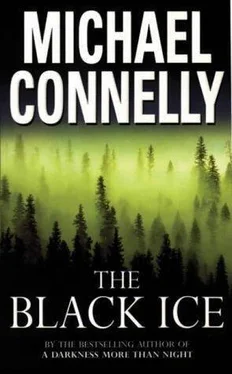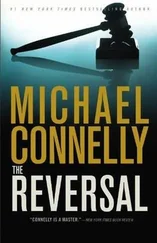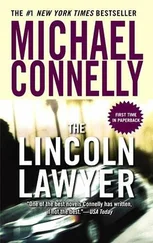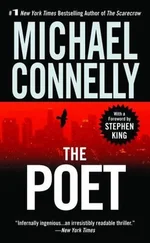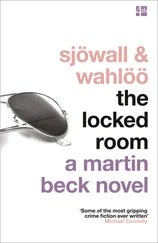“Where is it?”
“It’s on a road called Coyote Trail west of town. You take 98 out there past Pinto Wash to an area called Crucifixion Thorn. Turn onto Anza Road-like the hotel here in town. That’ll take you to Coyote Trail. The castle’s at the end of the road. You can’t miss it.”
“Who lives there now?”
“I don’t think anyone does. He left it to the city, you know. But the city couldn’t handle the upkeep on a place like that. They sold it-I believe the man came down from Los Angeles, matter of fact. But as far as I know he never moved in. It’s a pity. I was hoping to have maybe made a museum out of it.”
Bosch thanked him and left to head out to Crucifixion Thorn. He had no idea whether Castillo de los Ojos was anything more than a dead rich man’s estate with no bearing on his case. But he had nothing else going and his impulse was to keep moving forward.
State road 98 was a two-lane blacktop that stretched west from Calexico-town proper, running alongside the border, into farmland delineated into a huge grid by irrigation ditches. As he drove, he smelled green pepper and cilantro. And he realized after running alongside a field planted in cotton that this wide expanse was all once the Company’s huge acreage.
Ahead, the land rose into hills and he could see Calexico Moore’s boyhood home long before he was near. Castillo de los Ojos. The two arched windows were dark and hollow eyes against the peach-colored stone face of the tower rising from a promontory on the horizon.
Bosch crossed a bridge over a dry bed that he assumed was Pinto Wash, though there was no sign on the road. Glancing down into the dusty bed as he passed, Harry saw a lime-green Chevy Blazer parked below. He caught just a glimpse of a man behind the wheel with binoculars held to his eyes. Border Patrol. The driver was using the bed’s low spot as a blind from which he could watch the border for crossers.
The wash marked the end of the farmland. Almost immediately the earth began to rise into brown-brush hills. There was a turnout in the road by a stand of eucalyptus and oak trees that were still in the windless morning. This time there was a sign marking the location:
CRUCIFIXION THORN NATURAL AREA Danger Abandoned Mines
Bosch remembered seeing a reference in the books at the historical society to the turn-of-the-century gold mines that pockmarked the border zone. Fortunes had been found and lost by speculators. The hills had been heavy with bandits. Then the Company came and brought order.
He lit a cigarette and studied the tower, which was much closer now and rose from behind a walled compound. The stillness of the scene and the tower windows, like soulless eyes, somehow seemed morbid. The tower was not alone on the hill, though. He could see the barrel-tile roofs of other homes. But something about the tower rising singularly above them with its empty glass eyes seemed lonely. Dead.
Anza Road came up in another half mile. He turned north and the single-lane road curved and bumped and rose along the circumference of the hill. To his right he could look down on the farmland basin extending below. He turned left onto a road marked Coyote Trail and was soon passing large haciendas on sprawlng estates. He could see only the second floors of most of them because of the walls that surrounded almost every property.
Coyote Trail ended in a circle that went around an ancient oak tree with branches that would shade the turnaround in the summer. Castillo de los Ojos was here at the end of the road.
From the street, an eight-foot-high stone wall eclipsed all but the tower. Only through a black wrought-iron gate was there a fuller view. Bosch pulled onto the driveway and up to the gate. Heavy steel chain and lock kept it closed. He got out, looked through the bars and saw that the parking circle in front of the house was empty. The curtains inside every front window were pulled closed.
On the wall next to the gate were a mailbox and an intercom. He pushed the ringer but got no response. He wasn’t sure what he would have said if someone had answered. He opened the mailbox and found that empty too.
Bosch left his car where it was and walked back down Coyote Trail to the nearest house. This was one of the few without a wall. But there was a white picket fence and an intercom at the gate. And this time when he rang the buzzer, he got a response.
“Yes?” a woman’s voice asked.
“Yes, ma’am, police. I was wondering if I can ask a few questions about your neighbor’s house.”
“Which neighbor?”
The voice was very old.
“The castle.”
“Nobody lives there. Mr. Moore died some time ago.”
“I know that, ma’am. I was wondering if I could come in and talk to you a moment. I have identification.”
There was a delay before he heard a curt “Very well” over the speaker and the gate lock buzzed.
The woman insisted that he hold his ID up to a small window set in the door. He saw her in there, white-haired and decrepit, straining to see it from a wheelchair. She finally opened up.
“Why do they send a Los Angeles police officer?”
“Ma’am, I’m working on a Los Angeles case. It involves a man who used to live in the castle. As a boy, long ago.”
She looked up at him through squinting eyes, as if she was trying to see past a memory.
“Are you talking about Calexico Moore?”
“Yes. You knew him?”
“Is he hurt?”
Bosch hesitated, then said, “I’m afraid he’s dead.”
“Up there in Los Angeles?”
“Yes. He was a police officer. I think it had something to do with his life down here. That’s why I came out here. I don’t really know what to ask… He didn’t live here long. But you remember him, yes?”
“He didn’t live here long but that doesn’t mean I never saw him again. Quite the contrary. I saw him regularly over the years. He’d ride his bicycle or he’d drive a car and come and sit out there on the road and just watch that place. One time I had Marta bring him out a sandwich and a lemonade.”
He assumed Marta was the maid. These estates came with them.
“He’d just watch and remember, I guess,” the old woman was saying. “Terrible thing that Cecil did to him. He’s probably paying for it now, that Cecil.”
“What do you mean, ‘terrible’?”
“Sending the boy and his mother away like that. I don’t think he ever spoke to that boy or the woman again after that. But I’d see the boy and I’d see him as a man, come out here to look at the place. People ’round here say that’s why Cecil put that wall up. Did that twenty years ago. They say it’s because he got tired of seeing Calexico in the street. That was Cecil’s way of doing things. You don’t like what you see out your window, you put up a wall. But I’d still see young Cal from time to time. One time I took a cold drink out to him myself. I wasn’t in this chair then. He was sitting in a car, and I asked him, ‘Why do you come out here all the time?’ and he just said, ‘Aunt Mary, I like to remember.’ That’s what he said.”
“Aunt Mary?”
“Yes. I thought that was why you came here. My Anderson and Cecil were brothers, God rest their souls.”
Bosch nodded and waited a respectful five seconds before speaking.
“The man at the museum in town said Cecil had no children.”
“’Course he said that. Cecil kept it a secret from the public. Big secret. He didn’t want the company name blemished.”
“Calexico’s mother was the maid?”
“Yes, she-it sounds like you know all of this already.”
“Just a few parts. What happened? Why did he send her and the boy away?”
She hesitated before answering, as if to compose a story that was more than thirty years old.
Читать дальше
